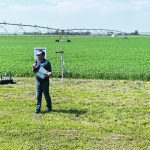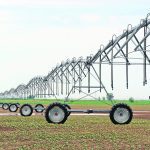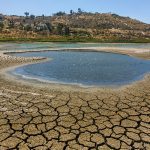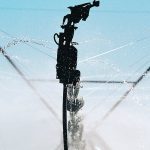Farmer-led initiative says producers, public need better information about how to handle too much or too little water
REGINA — A new collaboration in Saskatchewan is meant to improve communication about agricultural water. The Saskatchewan Drainage Extension Network (SK DEN) is a partnership led by farmers and farm organizations who want water better managed. Related story: Landowners struggle with unapproved drainage “When it comes to drainage management and irrigation, I think we have […] Read moreTag Archives irrigation — page 3

Irrigators say Sask. expansion plan is necessary
The expansion project has faced criticism in the province, but supporters argue it would boost the province’s GDP
REGINA — Proponents of Saskatchewan’s plan to add 90,000 acres of irrigation by rehabilitating a decades-old uncompleted project are looking forward to progress. The Westside Irrigation Rehabilitation (WIRP) project is part of a 10-year, $4-billion megaproject announced four years ago to expand Saskatchewan’s irrigable acres from Lake Diefenbaker to 500,000. At the time, the WIRP […] Read more
New technology increases irrigation efficiency
Research in Saskatchewan has found that using multispectral and thermal data can eliminate user input and save time
Variable rate systems are commonly associated with seeding or fertilizer application, but it’s also used in the world of irrigation. Those attending the Outlook Irrigation Field Day held last month near Outlook, Sask., heard about recent advancements with variable rate irrigation (VRI) systems that can lead to a more economical and sustainable use of water […] Read more
Irrigation must take soil needs into account: specialist
Len Hingley, an irrigation specialist with Alberta Agriculture and Irrigation, urges irrigators to consider proper rates based on soil media. “Rate is the amount of water that we apply at or below the infiltration rate of our soils, and it is driven by texture,” he said. Sand tops the list of soil particle sizes at […] Read more

Don’t fear FITFIR, says Alberta water expert
Glacier FarmMedia – Alberta river and reservoir levels remain lower than normal and water availability continues to worry irrigators. Will there be enough water to go around? What happens if there isn’t? Answers can be found in the province’s current Water Act, passed in 1999, which contains the same “first in time, first in right” […] Read more

Irrigation study in Alta. comes up dry
One definition of a consultant is someone who looks at your watch and tells you what time it is. The recently released consultant’s report, Adaptation Roadmap for the SSRB: Assessment of Strategic Water Management Projects to Support Economic Development in the South Saskatchewan River Basin, is a mirror reflecting the aspirations of the irrigation lobby. […] Read more

U.S., Mexico spar over water treaty as drought fears rise
REUTERS — Texas farm groups warn of a disastrous season ahead for citrus and sugar as Mexican and U.S. officials try to resolve a dispute over a decades-old water treaty that supplies U.S. farmers with critical irrigation. The neighbouring countries have tussled over the 1944 treaty before, but the current drought-driven water shortages are the […] Read more

Large southern Alberta water users agree to reduce water use in severe drought
Users include participating irrigation districts, municipalities and industries
Thirty-eight of the largest and oldest water licensees in southern Alberta — including irrigation districts — have agreed to reduce their water use if severe drought conditions develop this spring or summer. Described by the province of Alberta as “the largest water-sharing initiative in Alberta’s history,” these agreements are intended to ensure Albertans receive the […] Read more

Overdrawn at the public relations water well?
Glacier FarmMedia – It’s been a long stretch of dry years for Canadian producers, and they’ve been using more irrigation water as a result. Statistics Canada reports that farmers in Canada used 23 per cent more water in 2022 compared to 2020. At the same time, Canadians name water as their most important environmental pillar, […] Read more

Three western U.S. states propose additional water cuts
REUTERS — California, Arizona and Nevada have offered what they described as significant concessions on how much Colorado River water they claim as their counterparts nearer the river’s source proposed more modest changes that would protect their rights. The dual proposals renew longstanding tensions between the two groups of states within the Colorado River Compact, […] Read more




